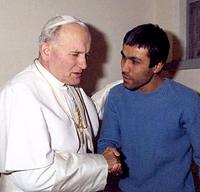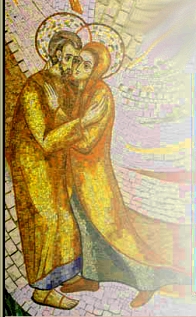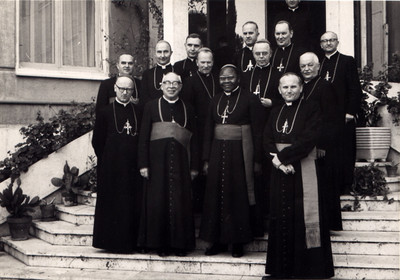Eric Giunta, a law student in Florida takes a look at some reasons why Pope John Paul II ought not be beatified with subsequent canonization in mind. For the record, I think Eric Giunta is off his rocker in his assessment of John Paul’s holiness and heroic virtue, human and papal. He lumps too many things together and he lacks certain theological nuance in doctrine and teaching and when considering matters of ecclesial governance. Additionally, I think he’s trying to hammer a wedge between the papacies of John Paul and that of Benedict which is unfortunate and wrongheaded. Giunta politicizes the Church which is common enough in today’s era, that is, he speaks of the Church more as an institution and does not consider that the Church is first and foremost a sacrament founded by Christ. Miss this point you miss the essential understanding of Christianity.
Tag: Saint John Paul II
Progress in John Paul’s beatification process
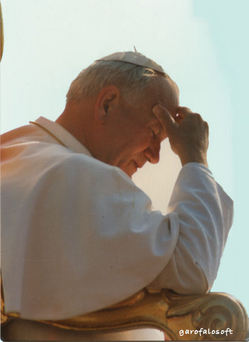 Yesterday morning [June 30] there was help at the Congregation
Yesterday morning [June 30] there was help at the Congregation
for Causes of Saints the second meeting of the theological consultors tasked to
examine the “Positio,” that is the documents and testimonies of the
cause for beatification of John Paul II. In the first meeting, about
which Il Giornale has spoken, was held on 13 May. But it had an
intermediate (or interlocutory… “interlocutorio”) outcome, because of
critical point raised not about the personal sanctity of Pope Wojtyla but about
the manner in which the work was advanced and the lack of documentation.
The postulator of the cause, Msgr. Slawomir Oder, responded in writing to the
objections and yesterday there was held the second and final meeting of the
theologians, which had given a favorable majority opinion. Two of them
maintained the initial “suspended judgment” (“sospensivo”)
because they though that the proofs and documents ought to have been integrated
(“il quadro probatorio e documentale debba essere integrato”). This is the article that was published in today’s Il Giornale. Now the
“Positio” goes to the cardinal and bishop members of the
Congregation, who before the end of the year will make a decision about the
heroic virtue of Pope Wojtyla. Then it will fall to Pope Benedict to
promulgate the decree which will bring his predecessor to beatification.
translation of Andrea Tornielli’s article)
Our Lady of Fatima
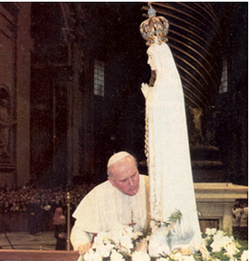 Blessed are you, holy Virgin Mary and worthy of all praise. For the sun of justice, Christ our God, was born of you.
Blessed are you, holy Virgin Mary and worthy of all praise. For the sun of justice, Christ our God, was born of you.
The Beauty and The Spirituality of Conjugal Love, the republished texts on married love by Karol Wojtyla/John Paul II
Recently a group
of priests re-published a set of texts written by Karol Wojtyla/John Paul II
about marriage and family. The book is called The Beauty and The
Spirituality of Conjugal Love.
Karol Wojtyla
wrote these texts in 1962 while he was the cardinal archbishop of Krakow based on
his pastoral experience in the years following the Second World War with young
and married peoples.
The point of
Wojtyla’s writing is to promote communion among people, especially married peoples, so as to live the Christian life. This book is a method of living married life in faith and not as a set of rules and prohibitions. These texts were published again in published 1990s but
received little attention. They are now offered again as a guide to marriage in the 21st century.
The video clip on the presentation.
John Paul II, remembered
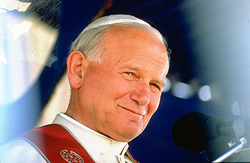 Today marks the fourth anniversary of the death of our beloved Pope John Paul II. His physical absence is felt but I believe that he’s interceding before the throne of grace for those who ask.
Today marks the fourth anniversary of the death of our beloved Pope John Paul II. His physical absence is felt but I believe that he’s interceding before the throne of grace for those who ask.
I consider myself in the John Paul generation and I look forward to the day that the Church beatifies and canonizes him. Even though I love Pope Benedict, I still love Pope John Paul. May his memory be eternal.
God, Who, in Thine ineffable providence, didst will that Thy servant John Paul II should be numbered among the high priests, grant, we beseech Thee, that he, who on earth held the place of Thine only-begotten Son, may be joined forevermore to the fellowship of Thy holy pontiffs. Through Christ our Lord.
Some newsworthy items:
Sophia Loren speaks about John Paul moving toward sainthood.
A Rabbi speaks about John Paul.
A video clip on the 6pm Mass offered by Pope Benedict for Pope John Paul II.
A video clip on the documentation of Pope John Paul’s move toward being called saint.
Carl Anderson reflects on his relationship with the Servant of God Pope John Paul II on this 4th anniversary of the Pope’s death.
Called to Love: Approaching John Paul II’s Theology of the Body
This new book, Called to Love: Approaching John Paul II’s Theology of the Body, due to be released on April 14, discusses John Paul II’s theology of the body and the meaning of human love. This interview appeared in the April 2009 issue of Columbia magazine, the organ of communication of the Knights of Columbus. I am grateful for the opportunity to re-publish it here.
By the Columbia Staff
From 1979 to 1984, Pope John Paul II delivered 129 Wednesday audiences in which he presented a vision of the human person, created as a unity of body and soul, and the vocation of every person to love. The pope’s catechesis, which has become known as the “theology of the body,” is considered by many to be revolutionary, as it develops profound truths about man’s most basic experiences — who we are and who we were created to be.
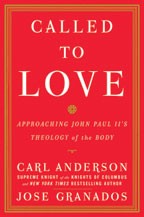 A new book about the theology of the body, which is being published this month, was co-authored by Supreme Knight Carl A. Anderson and Father José Granados, assistant professor at the Pontifical John Paul II Institute for Studies on Marriage and Family at The Catholic University of America in Washington, D.C. Titled Called to Love: Approaching John Paul II’s Theology of the Body (Doubleday), the book sheds light on the significance and implications of the pope’s insights.
A new book about the theology of the body, which is being published this month, was co-authored by Supreme Knight Carl A. Anderson and Father José Granados, assistant professor at the Pontifical John Paul II Institute for Studies on Marriage and Family at The Catholic University of America in Washington, D.C. Titled Called to Love: Approaching John Paul II’s Theology of the Body (Doubleday), the book sheds light on the significance and implications of the pope’s insights.
Father Granados: Theology does not only deal with our questions about God; it deals mainly with God’s word to us — that is, the way he talks with us and tells us about himself and his love for us. For theology, the Incarnation is central, this event in which God himself comes to meet us and becomes visible by assuming a human body. Because of the Incarnation, the body enters into the realm of theology. When the Word became flesh, God made clear to us that the body has a language able to talk about God and about the way he calls us to love him and each other.
Central to John Paul II’s insights is the concept of the communion of persons, which he sees as a reflection of the Trinity. In what way does the pope develop the traditional doctrine?
Father Granados: The good news of Christianity is that God is love, a communion of persons in which the Father gives himself totally to the Son in the union of the Holy Spirit. John Paul II has developed an understanding of the human person in the light of this Trinitarian love. Human love, and particularly the love of the family — between husband and wife, parent and child, brothers and sisters — is the mirror in which God’s love shines in the world, and man is able to share in it. John Paul II has taken this central theme of the tradition and has interpreted, in this light, the whole of man’s vocation and destiny.
What might people gain from studying the theology of the body? What inspired you to write this book?
Father Granados: The aim of this book is to help the reader discover the great vocation to which God calls him: a vocation to love. We often live unaware of this great call to love and thus are unable to give an answer to it. Because of this, our lives risk being wasted, without attaining their fulfillment. Through this book, we would like to reawaken the reader to the great news of his existence, to the wonder of God’s original plan for him. This means that the theology of the body is not only a teaching about human sexuality, but it also contains a whole understanding of the human person and of the world. In fact, John Paul II’s aim is to give an account of the whole of reality in terms of love.
Even before becoming Pope John Paul II, Karol Wojtyla had decades of pastoral experience and wrote on matters related to marriage and family. Why is the family so important, and what does the theology of the body teach us about the nature of human love?
Father Granados: According to John Paul II, the family is the place where we discover who we are. The pope speaks in this regard of the genealogy of the person. Our identity as human persons is formed in the family. The fact that we are children of our parents, for example, is not something accidental, but constitutes a central part of our being. The same is true for a parent; it is not just that a person has a child, but that he is a father or mother. In the family, we understand that we come from another as children and are called to become spouses and parents. In other words, one’s life is defined by an original love that is first received, as a child, and then given to another in order to be fruitful.
Beginning with man’s “original experiences” in the first chapters of Genesis, the catechesis on the theology of the body is, in a way, a Scriptural commentary about human nature. What role does Christian revelation play in understanding who we are? Can we explain John Paul II’s insights in secular terms?
Father Granados: Modern man suffers from a crisis of identity. We need to know who we are and what our path in life is. In the book of Genesis, John Paul II saw the genetic code of our identity as human beings. For instance, the pope talks about an original solitude: Adam realizes in the garden that he is alone. This experience is interpreted in the light of man’s relationship with the Creator, the only one who fulfills our expectations and desires. This means that our identity is always constituted before the mystery of God, as creatures who come from him.
John Paul II then adds the experience of unity: We only know who we are and how to reach God when we encounter another person through love. Precisely because the pope starts with an analysis of human experience, the theology of the body is universal and refers not just to Christians. Every human being asks himself about the meaning of life and how to find fulfillment. The theology of the body answers these questions in terms of love.
The book is being released one year after Pope Benedict XVI’s visit to the
Father Granados: At the beginning of his pontificate, Benedict said that he did not want to write much, because he conceived his mission as making John Paul II’s great work better known. In fact, Benedict’s first encyclical, Deus Caritas Est (God is Love) was a continuation of John Paul II’s work on love. Like his predecessor, Benedict takes as his point of departure the way Christ reveals to man his own vocation. In Deus Caritas Est, he writes that in order to give a good definition of love, we will need to start by looking at the Crucified one (12). It is at the foot of the Cross that we learn what love is all about.
Presence in the blogosphere
Sometimes I get weary about blogging because of the time it takes and some days it seems so boring. So I ask questions like: is it useful, for whom am I writing, for what reason, is this just an ego-trip, etc. I came across a few lines of Pope John Paul II which gives me slight encouragement. He said:
The special challenge before you, is to find ways to ensure that the voice of the Church is not marginalized or silenced in the modern arena of the media. You have a role to play in ensuring that the Gospel is not confined to a strictly private world. No! Jesus Christ must be proclaimed to the whole world; and therefore the Church must enter the great forum of the media with courage and confidence.
From the Heart of God: Vatican II & Pope John Paul II
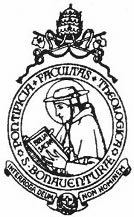 On October 28, 2008, Pope Benedict wrote to Most Reverend Father Marco Tasca Minister General of the Friars Minor Conventual and Grand Chancellor of The Pontifical Theological Faculty of St Bonaventure Seraphicum on the occasion of an institute dealing with the theme of “The Second Vatican Council in the Pontificate of John Paul II.” Here are a few relevant paragraphs from His Holiness:
On October 28, 2008, Pope Benedict wrote to Most Reverend Father Marco Tasca Minister General of the Friars Minor Conventual and Grand Chancellor of The Pontifical Theological Faculty of St Bonaventure Seraphicum on the occasion of an institute dealing with the theme of “The Second Vatican Council in the Pontificate of John Paul II.” Here are a few relevant paragraphs from His Holiness:
I can only rejoice at the choice of a theme that unites two topics of quite special interest to me: on the one hand, the Second Vatican Council, in which I had the honour of taking part as an expert and on the other, the figure of my beloved Predecessor John Paul II who made a significant personal contribution to that Council as a Council Father and subsequently, by God’s will, became its first executor during the years of his Pontificate. In this context it seems only right also to recall that the Council sprang from the great heart of Pope John XXIII, the 50th anniversary of whose election to the Chair of Peter we are commemorating today, 28 October. I said that the Council sprang from John XXIII’s heart, yet it would be more accurate to say that ultimately, like all the great events in the Church’s history, it came from the Heart of God, from his saving will: “God so loved the world that he gave his only Son, that whoever believes in him should not perish but have eternal life” (Jn 3: 16). To make divine salvation accessible to contemporary man was Pope John XXIII’s main reason for convoking the Council, and the Fathers worked with this in mind. For this very reason, “As the years have passed, the Conciliar Documents” as I recalled on 20 April 2005, the day after my election to the Pontificate, “have lost none of their timeliness; indeed, their teachings are proving particularly relevant to the new situation of the Church and the current globalized society” (Message to Cardinals, 20 April 2005).
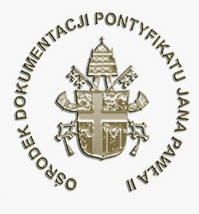 In practically all his documents, and especially in his decisions and his behaviour as Pontiff, John Paul II accepted the fundamental petitions of the Second Vatican Council, thus becoming a qualified interpreter and coherent witness of it. His constant concern was to make known to all the advantages that could stem from acceptance of the Conciliar vision, not only for the good of the Church but also for that of civil society itself and of the people working in it. “We have contracted a debt to the Holy Spirit”, he said in his Reflection prior to the Angelus on 6 October 1985, referring to the extraordinary session of the Synod of Bishops which was about to be celebrated precisely in order to reflect on the Church’s response during the 20 years that had passed since the conclusion of the Second Vatican Council. “We have contracted a debt to the Spirit of Christ…. This, in fact, is the Spirit who speaks to the Churches (cf. Rv 2: 7); during the Council and by means of it, his word has become particularly expressive and decisive for the Church” (ore, 14 October 1985, p. 12).
In practically all his documents, and especially in his decisions and his behaviour as Pontiff, John Paul II accepted the fundamental petitions of the Second Vatican Council, thus becoming a qualified interpreter and coherent witness of it. His constant concern was to make known to all the advantages that could stem from acceptance of the Conciliar vision, not only for the good of the Church but also for that of civil society itself and of the people working in it. “We have contracted a debt to the Holy Spirit”, he said in his Reflection prior to the Angelus on 6 October 1985, referring to the extraordinary session of the Synod of Bishops which was about to be celebrated precisely in order to reflect on the Church’s response during the 20 years that had passed since the conclusion of the Second Vatican Council. “We have contracted a debt to the Spirit of Christ…. This, in fact, is the Spirit who speaks to the Churches (cf. Rv 2: 7); during the Council and by means of it, his word has become particularly expressive and decisive for the Church” (ore, 14 October 1985, p. 12).
We are all truly indebted to him for this extraordinary ecclesial event. The multiple doctrinal legacy that we find in its Dogmatic Constitutions, Declarations and Decrees still stimulates us to deepen our knowledge of the Word of God in order to apply it to the Church in the present day, keeping clearly in mind the many needs of the men and women of the contemporary world who are extremely in need of knowing and experiencing the light of Christian hope. The Synod of Bishops that has just ended placed these needs at the centre of its own rich and fruitful reflections, reaffirming the hope expressed in the past by the Constitution Dei Verbum: “So may it come that, by the reading and study of the sacred books, “the Word of God may speed on and triumph’ (2 Thes 3: 1), and the treasure of the Revelation entrusted to the Church may more and more fill the hearts of men” (n. 26), bringing them the salvation of God and with it authentic happiness.
This is a commitment that I am pleased to entrust in particular to you, dear Professors of the Pontifical Theological Faculty, who venerate the Seraphic Doctor St Bonaventure as its heavenly Patron. In the wealth of his thought, St Bonaventure can offer interpretative keys which are still up-to-date and with which you may approach the Conciliar Documents to seek in them satisfactory answers to the many questions of our time. The anxiety for humanity’s salvation which motivated the Council Fathers, guiding their commitment in the search for solutions to the numerous problems of the day was equally alive in St Bonaventure’s heart as he faced the hopes and anguish of the people of his own time. On the other hand, since the basic questions that man carries in his heart do not change with the changing of times, the answers the Seraphic Doctor attained have remained substantially applicable also in our day. In particular, the Itinerarium mentis in Deum that St Bonaventure composed in 1259 has remained valid. Although it is a guide to the heights of mystical theology, this precious little book also speaks to all Christians of what is essential in their lives. The ultimate goal of all our activities must be communion with the living God. Thus, for the Fathers of the Second Vatican Council too, the ultimate aim of all the individual aspects of the Church’s renewal was to lead the faithful to the living God revealed in Jesus Christ.
The Catholic approach to sport
The Vatican’s Council for the Laity is establishing a foundation to encourage good
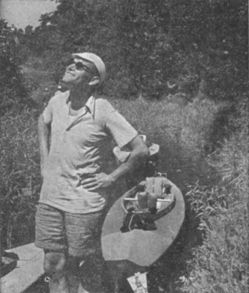 sportsmanship under the patronage of Pope John Paul II. The John Paul II Foundation for Sports will be headquartered on the Via della Conciliazione, directly in front of St. Peter’s Square. The Foundation will be operated under the patronage of the Pontifical Council for the Laity. The aim is to encourage the values of the Gospel through sports.
sportsmanship under the patronage of Pope John Paul II. The John Paul II Foundation for Sports will be headquartered on the Via della Conciliazione, directly in front of St. Peter’s Square. The Foundation will be operated under the patronage of the Pontifical Council for the Laity. The aim is to encourage the values of the Gospel through sports.
My family is somewhat athletic, well, at least my father and sister are engaged with some kind athletic activity. My father rides a motor cycle and hunting and Lauren plays softball. Me, on the other hand, would rather watch from the sideline. Would you believe I was a freshman soccer coach when I was teaching at Fairfield Prep? And would you believe the team was undefeated? You ought to believe me because it is true. Nevertheless, I recall being impressed by the young and vigorous Fr. Karol Woytjla doing outside activity. I had never seen priests doing sports activities before. What a shock! In fact, one of favorite pictures of Fr. Karol is saying Mass on the underside of a canoe with a makeshift cross in the background. The connection between
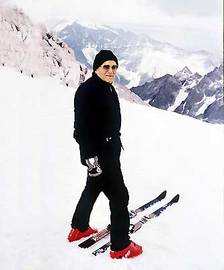 natural beauty and the divine beauty (Mass) is a remarkable encounter. Later we see how Pope John Paul II very much knew the importance the role sports plays in culture as he addressed the topic in some 120 addresses.
natural beauty and the divine beauty (Mass) is a remarkable encounter. Later we see how Pope John Paul II very much knew the importance the role sports plays in culture as he addressed the topic in some 120 addresses.
Edio Costantini, the foundation’s president, explained that one of the main objectives of the foundation is to relaunch parishes’ educational venues. He also said “The creation of the foundation and the beginning of its activities coincides, not by coincidence, with the Pauline Year. In his letters, St. Paul often referred to the Christian life as an athletic race that, in the end, would be awarded with an incorruptible crown.”
The Foundation’s first undertaking will be a series of marathons to take place between Bethlehem and Rome. The marathons will begin next April 24 and end June 21 in St. Peter’s Square.
Why is the Church interested in promoting good sport? Archbishop Stanislaus Rylko writes in the preface of the proceedings, “The World of Sport Today: Field of Christian Mission”:
To achieve these lofty objectives sport nevertheless needs to discover its deepest ethos, and comply with the basic principle of the primacy of the human person. He therefore urged people to adopt a healthy approach to sport,
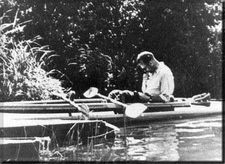 so that sport is not practised as an end in itself, giving rise to the danger of becoming a vain and harmful idol, but to make it a meaningful instrument for the comprehensive development of the person and the construction of a society made more to the measure of Man. “When understood in this way, sport is not an end, but a means; it can become a vehicle of civility and genuine recreation, encouraging people to put the best of themselves on the field and to avoid what might be dangerous or seriously harmful to themselves or to others.” In other words, for John Paul II, the world of sport is an important areopagus of modern times, awaiting apostles who are ready to boldly announce the Gospel of Jesus Christ.
so that sport is not practised as an end in itself, giving rise to the danger of becoming a vain and harmful idol, but to make it a meaningful instrument for the comprehensive development of the person and the construction of a society made more to the measure of Man. “When understood in this way, sport is not an end, but a means; it can become a vehicle of civility and genuine recreation, encouraging people to put the best of themselves on the field and to avoid what might be dangerous or seriously harmful to themselves or to others.” In other words, for John Paul II, the world of sport is an important areopagus of modern times, awaiting apostles who are ready to boldly announce the Gospel of Jesus Christ.
